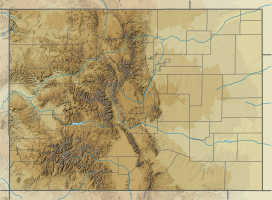James Peak
| James Peak | |
|---|---|
 James Peak at dawn viewed from Green Mountain in Boulder County. | |
| Highest point | |
| Elevation | 13,294 ft (4,052 m)[1][2] |
| Prominence | 714 ft (218 m)[2] |
| Isolation | 1.55 mi (2.49 km)[2] |
| Listing | Colorado county high points 27th |
| Coordinates | 39°51′08″N 105°41′24″W / 39.8522094°N 105.6900039°W[3] |
| Naming | |
| Etymology | Edwin James |
| Geography | |
| Location | Continental Divide at the tripoint of Clear Creek, Gilpin, and Grand counties, Colorado, United States. High point of Gilpin County.[2] |
| Parent range | Front Range[2] |
| Topo map(s) | USGS 7.5' topographic map Empire, Colorado[3] |
James Peak is a high mountain summit in the Front Range of the Rocky Mountains of North America. The 13,300-foot (4,054 m) thirteener is located on the Continental Divide in the James Peak Wilderness of Arapaho National Forest and Roosevelt National Forest, 5.2 miles (8.4 km) east-southeast (bearing 110°) of the Town of Winter Park, Colorado, United States. The summit is the tripoint of Clear Creek, Gilpin, and Grand counties. The peak is the highest point in Gilpin County and the James Peak Wilderness.[1][2][3]
James Peak is named after Dr. Edwin James, the botanist on Major Stephen H. Long's expedition of 1820. James is the first known person to successfully climb Pikes Peak.[4]
James Peak has a broad south slope that is very popular with hikers. The steep, sheer walls of the east face, offer multiple technical couloirs for snow climbers, skiers, and snowboarders. From south to north, these routes are named 'Bailout', 'Starlight', 'Sky Pilot', 'Shooting Star', and 'Superstar'.[5]
See also
References
- ^ a b The elevation of James Peak includes an adjustment of +1.789 m (+5.86 ft) from NGVD 29 to NAVD 88.
- ^ a b c d e f "James Peak, Colorado". Peakbagger.com. Retrieved October 20, 2014.
- ^ a b c "James Peak". Geographic Names Information System. United States Geological Survey, United States Department of the Interior. Retrieved October 20, 2014.
- ^ Dziezynski, James (1 August 2012). Best Summit Hikes in Colorado: An Opinionated Guide to 50+ Ascents of Classic and Little-Known Peaks from 8,144 to 14,433 Feet. Wilderness Press. p. 58. ISBN 978-0-89997-713-3.
- ^ Bueler, William M (2000). Roof of the Rockies (3rd ed.). Golden Colorado: The Colorado Mountain Club Press. ISBN 9780967146614.

